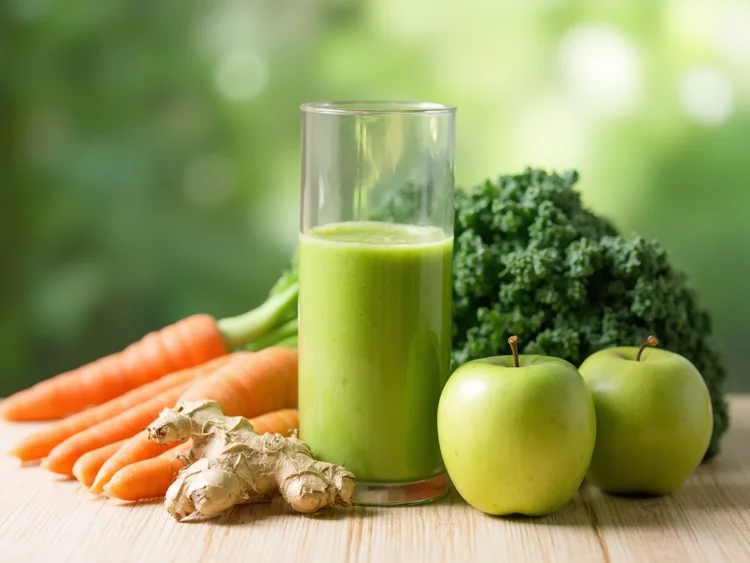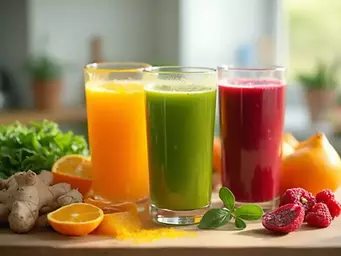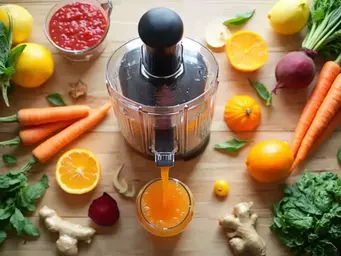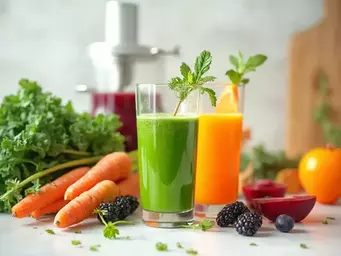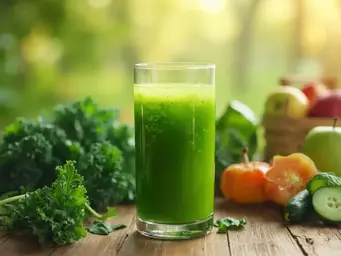Curious about how organic juicing can elevate your health? Consider this: organic fruits and vegetables not only taste better but also pack a nutritional punch that can transform your wellness journey. Let's delve into the benefits of choosing organic for your juicing routine!
What You Will Learn
- Organic produce is free from synthetic pesticides and fertilizers, making your juice cleaner and safer.
- Higher nutrient density in organic fruits and vegetables means more vitamins, minerals, and antioxidants in your juice.
- Incorporating superfoods like kale and blueberries can enhance the nutritional profile of your juices.
- Juicing can support immune health, improve digestion, and provide natural energy boosts.
- Preparation and planning are key to successfully integrating juicing into your daily health routine.
Organic Juicing Benefits: Nutrient Density vs. Health Impact
Organic juicing offers distinct advantages, leading to enhanced nutrient content and significant health improvements. This visual highlights the key benefits.
Nutrient Density Advantages
- ✓Higher Vitamins & Minerals
- ✓Increased Antioxidants
- ✓Enhanced Natural Flavor
Organic produce delivers more potent and healthful juices, free from synthetic chemicals.
Key Health Benefits
- ✓Boosts Immune System
- ✓Supports Healthy Digestion
- ✓Provides Natural Energy
Incorporating organic juices into your diet supports overall wellness and environmental health.
Understanding Organic Juicing Ingredients and Their Benefits
Juicing is a wonderful way to harness the goodness of nature, and choosing organic ingredients can make all the difference. By opting for organic fruits and vegetables, you not only enhance the flavor of your juice but also boost its nutritional value. Let’s dive into why you should consider using organic produce for your juicing needs!
Why Choose Organic for Your Juicing Needs?
When it comes to juicing, I believe that organic produce offers distinct advantages. First off, organic fruits and vegetables are grown without synthetic pesticides and fertilizers, which means you're drinking juice that is cleaner and safer for your health. This commitment to quality allows your body to absorb more nutrients without the interference of harmful chemicals. For comprehensive guidelines on organic production and labeling, refer to the National Standard for Organic and Biodynamic Produce.
The Nutrient Density of Organic Produce
- Higher levels of vitamins and minerals
- Increased antioxidants that combat free radicals
- Better flavor, leading to a more enjoyable juicing experience
One of the most compelling reasons to choose organic is the nutrient density. Studies have shown that organic produce often contains higher levels of essential nutrients, which translates into a more potent and healthful juice. Imagine sipping a glass of juice packed with antioxidants and vitamins—much better than your average store-bought juice, right?
Health Benefits: Immunity, Digestion, and More
Incorporating organic juices into your diet can lead to a multitude of health benefits. For instance, fresh organic juices can bolster your immune system, support healthy digestion, and provide a natural energy boost. The combination of vitamins and minerals found in organic fruits and veggies plays a crucial role in maintaining overall wellness. Adhering to food standards, such as those outlined in the Food Standards Code, ensures the safety and quality of your ingredients.
Plus, when you juice with organic ingredients, you're not just nourishing your body; you're also making a positive impact on the environment. By choosing organic, you contribute to sustainable farming practices that protect our planet. How cool is that?
Superfoods to Enhance Your Juicing Experience
To take your juicing game to the next level, consider adding some superfoods to your mix! These powerhouse ingredients can enhance the nutritional profile of your juices, making them even more beneficial. Let’s explore some favorites!
Incorporating Organic Fruits and Vegetables for Maximum Nutrition
- Kale: Rich in vitamins A, C, and K
- Blueberries: Packed with antioxidants
- Beets: Great for liver health and detoxification
Each of these superfoods brings something unique to the table. For example, kale is a nutrient-dense leafy green that adds a vibrant color and a ton of health benefits to your juice. On the other hand, blueberries are not only delicious but also help support brain function and skin health! For further insights into food safety and ingredient approvals, consult resources like the Approval Report for food ingredients.
Key Nutritional Supplements to Consider for Juicing
- Chia seeds: Boosts omega-3s and fiber
- Spirulina: A concentrated source of protein and vitamins
- Ginger: Aids digestion and adds a zesty kick
Adding nutritional supplements like chia seeds can provide additional fiber, while spirulina offers a protein boost. These ingredients can truly elevate your juicing experience, helping you feel your best every day!
Pro Tip
To maximize the benefits of your organic juices, try to incorporate a variety of colors in your ingredients. Different colors often represent different nutrients— for instance, orange fruits and vegetables are high in beta-carotene, while dark greens are rich in iron. This rainbow approach not only enhances your juice’s nutritional profile but also makes it visually appealing!
Integrating Organic Juicing into Your Health Routine
At The Juicing Hub, I believe that incorporating organic juicing into your health routine can be a game-changer! Juicing is not just a trend—it's a vibrant way to complement your diet with essential nutrients. By choosing organic ingredients, you’re taking steps towards a healthier, more sustainable lifestyle.
When I first started my juicing journey, I quickly learned that it's crucial to balance your juicing with a comprehensive diet. Juicing can be an excellent source of vitamins, minerals, and antioxidants, but it should enhance—not replace—your regular meals. Let’s explore how to effectively integrate juicing into your daily health routine.
Balancing Juicing with a Comprehensive Diet
Understanding the role of juicing in overall health is vital. Juicing provides a quick and easy way to consume a variety of fruits and vegetables, which can be particularly beneficial for those who struggle to meet their daily intake. Here are some key points to consider:
- Vibrant Nutrients: Fresh juices are packed with vitamins that can help boost your immune system.
- Hydration: Juicing can be a tasty way to stay hydrated, especially when incorporating water-rich fruits like watermelon.
- Digestive Aid: Some juices can aid digestion, particularly those with ginger or lemon.
As you embrace juicing, remember that variety is key! Rotate your ingredients to maximize nutrient intake while keeping your taste buds excited. I often experiment with different combinations to find my favorites, and I encourage you to do the same!
Tips for Successful Juicing at Home
Ready to kick off your juicing routine? Here are some tips that have helped me and can help you too:
- Start Simple: Begin with basic recipes and gradually incorporate new ingredients as you get comfortable.
- Prep Ahead: Wash and chop fruits and vegetables in advance to make juicing easier during busy days.
- Invest in Quality: Choose a juicer that suits your needs—consider masticating juicers for maximum nutrient retention.
By setting yourself up for success, you’ll find juicing to be an enjoyable and rewarding experience, enhancing both your health and culinary skills!
Juice Cleanse Programs: Benefits and Considerations
Considering a juice cleanse? Let’s dive into what to expect and how to prepare for a successful experience. Juice cleanses can vary in duration and intensity, but they often aim to detoxify your body while giving your digestive system a break. Here’s what you can expect:
- Initial Adjustment: Your body may experience cravings or fatigue initially as it adjusts to the cleanse.
- Increased Energy: Many people report feeling more energetic and lighter after a few days of juicing.
- Focus on Hydration: Staying hydrated is essential during a cleanse, so drink plenty of water alongside your juices!
With the right mindset and preparation, a juice cleanse can be a refreshing reset for your body. I’ve found them to be a wonderful opportunity to experiment with new flavors and reinvigorate my passion for juicing!
How to Prepare for a Successful Juice Cleanse
Preparation is key for any juice cleanse! Here are some practical steps to ensure you’re ready:
- Consult a Professional: If you have any health concerns, it’s wise to consult with a nutritionist before starting.
- Plan Your Juices: Decide on your juice recipes in advance and gather all ingredients to avoid last-minute stress.
- Ease Into It: Gradually reduce food intake a few days prior to the cleanse to help your body adjust.
By following these steps, you’ll be well-equipped to embark on a juice cleanse that revitalizes your health and spirit. Remember, it’s all about finding what works best for you!
Frequently Asked Questions About Organic Juicing
- Q: Why should I choose organic produce for juicing?
- A: Choosing organic produce ensures your juice is free from synthetic pesticides and fertilizers, leading to a cleaner, safer, and often more nutrient-dense beverage. Organic produce typically contains higher levels of essential vitamins, minerals, and antioxidants.
- Q: What are the main health benefits of organic juicing?
- A: Organic juicing can significantly boost your immune system, support healthy digestion, and provide a natural energy lift. The rich concentration of vitamins and minerals in organic ingredients contributes to overall wellness.
- Q: What superfoods can I add to enhance my organic juices?
- A: Great superfoods to include are kale (rich in vitamins A, C, K), blueberries (packed with antioxidants), beets (beneficial for liver health and detoxification), chia seeds (for omega-3s and fiber), and spirulina (a concentrated source of protein and vitamins).
- Q: How can I integrate organic juicing into my daily routine?
- A: Start with simple recipes, prep your fruits and vegetables in advance, and invest in a quality juicer. Remember that juicing should complement a comprehensive diet, not replace meals. Experiment with different organic ingredients to keep it exciting!
- Q: What should I consider before starting a juice cleanse?
- A: Before a juice cleanse, it's advisable to consult with a nutritionist, plan your juice recipes, and gather all necessary ingredients. Gradually reduce your food intake a few days prior to help your body adjust. Staying well-hydrated with water alongside your juices is also crucial.
Recap of Key Points
Here is a quick recap of the important points discussed in the article:
- Organic ingredients enhance the flavor and nutritional value of juices by being free from synthetic pesticides and fertilizers.
- Organic produce often contains higher levels of essential nutrients, antioxidants, and vitamins, leading to a more healthful juice.
- Incorporating organic juices can bolster your immune system, support digestion, and provide natural energy.
- Adding superfoods like kale, blueberries, and beets can significantly enhance the nutritional profile of your juices.
- Balancing juicing with a comprehensive diet ensures you receive a variety of nutrients while enjoying delicious flavors.
- Preparation and simplicity are key to successful juicing at home—start with basic recipes and prep ingredients ahead of time.
- When considering juice cleanses, proper preparation and hydration are essential for a successful experience.
